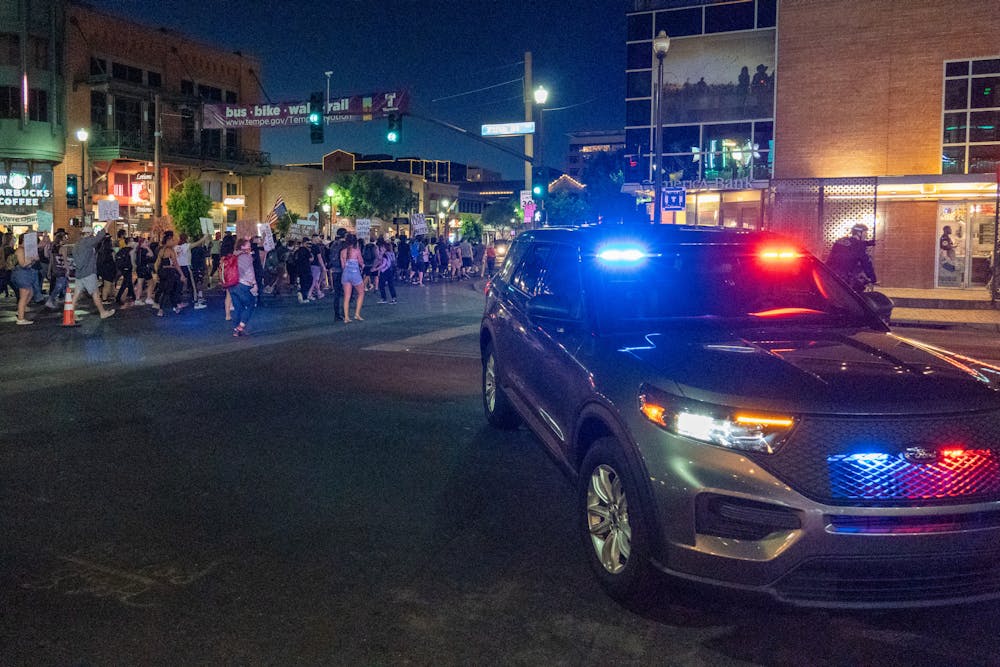The Tempe Police Department will likely receive its accreditation renewal from the Arizona Law Enforcement Accreditation Program (ALEAP) in spring 2022, said Tempe City Councilmember Joel Navarro Nov. 3 at a discussion about the process and the department's attempts at de-escalation.
Both the de-escalation training and efforts to earn back accreditation, a title given to public safety agencies after they thoroughly analyze adherence to standards in all aspects of policing, are intended to ensure Tempe PD is reliably and responsibly protecting the community.
Sara Soldo, Tempe PD's accreditation manager, said the renewal and training were created to improve Tempe PD while avoiding defunding the department, something that was highly encouraged by many in the Tempe community last year.
Michael White, a professor in the School of Criminology and Criminal Justice at the Watts College of Public Service and Community Solutions, was the lead researcher in ASU's 18-month de-escalation study and said there are only two other studies outside of the research conducted at the University that have analyzed police de-escalation.
"There was no consensus on what it is, on what it involves, what's included, does it work?" White said. "So when we realized that, we decided we had an opportunity to try to fill that research gap."
The two other studies were conducted in 2020, including an analysis of the de-escalation training program with the Louisville Metro Police Department in Kentucky and a general analysis of social interaction police training.
White said applying de-escalation training in other police departments will depend on the department and its community's needs.
"What works in Tempe may not work in Sacramento or Newark or Boston," White wrote in an email. "The training should be customized to the local communities and officers."
The death of George Floyd and several other people of color at the hands of police sparked protests against police brutality taking the country by storm last summer. Demonstrations part of the Black Lives Matter movement have forced police departments to reconsider policies.
Knowledge of Tempe PD's use of force became mainstream when a former Tempe police officer shot and killed 14-year-old Antonio Arce in 2019 after mistaking the boy's airsoft gun as a weapon. This prompted citywide protests against the department.
READ MORE: Tempe agrees to $2 million settlement over police shooting of 14 year old
Soldo, who is also an active officer, said programs are especially important now considering the public's mistrust of police.
"It's no shock for anyone that law enforcement is kind of at a low right now," Soldo said. "(Accreditation) is a way for us to implement some best practices and standards and hold each other and ourselves accountable to a point where maybe we can build some of that trust back."
Commander Dane Sorensen, an active officer who oversees Tempe PD's de-escalation training, said the department keeps track of use of force by analyzing body camera footage monthly. Sorensen said officers who are found using excessive force are required to undergo more training.
"When someone is not doing a good enough job, we set aside every third Thursday of every month and we have individual training to bring them up to speed on how that situation could have been handled better," Sorensen said.
Ivan Del Rio, president of the Restorative Justice Advocates at ASU and a senior in justice studies, said he feels the de-escalation training will not be enough to prevent people from being killed by police.
"(Tempe PD) is educating people to be better, which is a step in the right direction," Del Rio said. "However, the flaw in this would be that ... there's still going to be a police officer going into a scenario with his hand on his gun at all times."
Orlando Johnson, president and CEO of the Justice Society for Activism and a 2020 ASU graduate, said police departments need to interact more with the community to earn trust until there is legislation that will ensure law enforcement is held accountable.
"It's important to have the Tempe Police conduct seminars and conduct meetings with (students of color) and try to get an idea where they are coming from so going forward that we kind of have a plan in place that's sustainable," Johnson said. "It just feels as though this is a Band-Aid over a wound that I think is going to continue to unfortunately bleed out until we do something."
Accreditation process
Tempe PD started the accreditation process again through the ALEAP in summer 2020, and Soldo expects the process to be completed by spring 2022. Once ALEAP accreditation is earned, it lasts for four years.
According to Soldo, the last time Tempe PD received accreditation was around 20 years ago, adding that police departments wanted to avoid the "strenuous process."
The department was spurred to undergo the accreditation process when the Trump administration passed Executive Order 13929, which limits funding to police departments that do not have accreditation, Soldo said.
De-escalation training curriculum
Sorensen said Tempe PD decided to create its own curriculum in 2017.
"There were programs out there that you could buy ... but there was no data on what it was, what exactly (were) they teaching, (was) it backed by research, nothing," Sorensen said during his presentation Nov. 3.
White, the ASU researcher, said part of the 10-hour de-escalation course involved ASU professors teaching officers "components of emotional intelligence and communication" they could use to analyze situations while on duty.
The trainees also worked with an officer experienced in crisis intervention to learn more about how to approach people who are displaying signs of a mental crisis.
Another aspect of the de-escalation course was the "patrol model," which Sorensen said allowed officers the opportunity to practice individualizing their approach.
"The patrol model is essentially the operational pillar of the de-escalation," Sorensen said during his presentation. "We want our officers to go into each and every call for service thinking of a way to handle that call for service correctly."
Through analyzing body camera footage from six months before and after the training process, White said the study found significantly fewer people were harmed by those who went through the de-escalation program in comparison to officers who did not.
"Officers who had the training were 58% less likely to injure a citizen during the use of force encounter," White said. "In fact, there were 16 different findings that show that officers who received the training handled encounters differently, from showing greater levels of respect (to) listening better in resolving encounters."
READ MORE: Tempe City Council makes default budget decisions, bids Mitchell farewell
Del Rio said that despite efforts to make amends, uses of excessive force will remain a part of a police department's legacy because "it goes with their values (and) it's part of their reputation because it's part of who they are."
Given that precedent, Johnson said it will be important for police officers to be more active in the community to build a more trusting relationship with the public.
"Rebuilding those relationships, getting that civic engagement within the communities and within the student body ... that are minorities, I think that's an important step in trying to close the wound and try to repair this whole unfortunate situation," Johnson said.
Reach the reporter at awaiss@asu.edu and follow @WaissAlexis on Twitter.
Like The State Press on Facebook and follow @statepress on Twitter.
Continue supporting student journalism and donate to The State Press today.

Alexis Waiss is an assignment editor and senior reporter, covering breaking news and writing long-form stories. Alexis worked on SP's politics desk for a year, where she reported on the Legislature, higher education policy, student government, the city of Tempe and stories highlighting social justice. She previously worked as a fellow for the Asian American Journalist Association's VOICES program.




